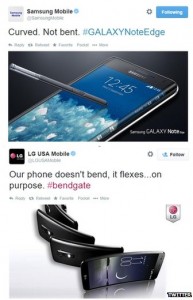 Apple has been under fire from not only the general public, but companies within and even outside of the tech market recently. What is now a trend on twitter, “#bendgate,” refers to the problems that consumers are having with one of Apple’s latest products, the iPhone 6 Plus. According to reports, if the phone is put under pressure, whether that be through sitting for long periods of time with the phone in a skinny jeans pocket, or simply applying too much torsion on the phone, it can develop an unsightly and permanent bend near the volume control buttons.
Apple has been under fire from not only the general public, but companies within and even outside of the tech market recently. What is now a trend on twitter, “#bendgate,” refers to the problems that consumers are having with one of Apple’s latest products, the iPhone 6 Plus. According to reports, if the phone is put under pressure, whether that be through sitting for long periods of time with the phone in a skinny jeans pocket, or simply applying too much torsion on the phone, it can develop an unsightly and permanent bend near the volume control buttons.
Companies such as Samsung, and LG have partaken in the opportunity to criticize Apple for the defect. Samsung posted a picture on twitter of their phone the Note Edge with the caption, “Curved. Not bent.” LG took a similar approach, promoting their device, the LG Flex, with the caption, “Our phone doesn’t bend, it flexes… on purpose. #bendgate.”
Companies like Samsung and LG are taking advantage of what Ries and Trout call, “Repositioning the Competition,” by promoting by criticizing Apple’s new release in an attempt to gain new customers. The mobile device market is almost completely fixed, and lately, there is not a lot of opportunity for unique positions that can be held. In order for a company to gain market share from Apple, this is certainly an effective approach.
Although the iPhone 6 Plus has been getting a lot of criticism for being cheaply made, Apple has released a statement assuring the public that there has only been nine customer complaints of having a bent iPhone. In addition, Apple stated that they use “high-quality materials,” and a bent phone is “extremely rare.”
Click here to read more in this BBC article: “Apple says bent iPhones are ‘rare'”
Image taken from BBC article above.